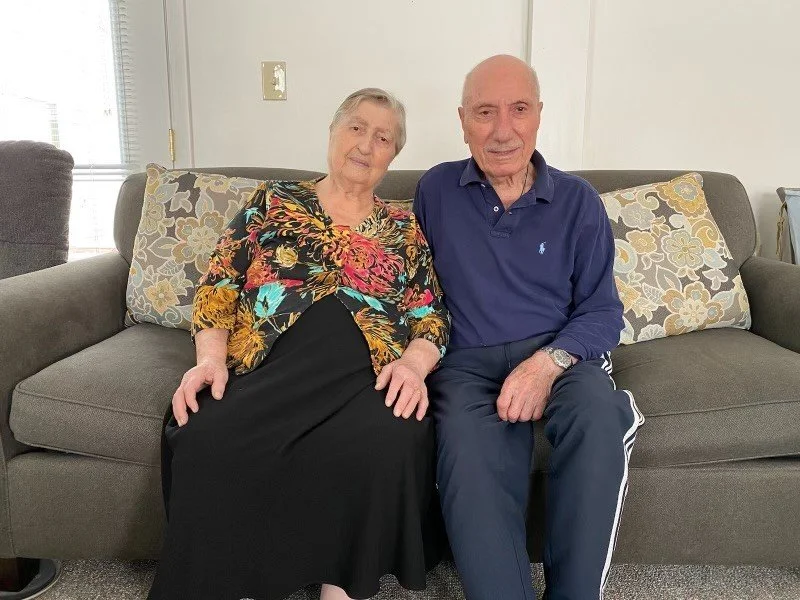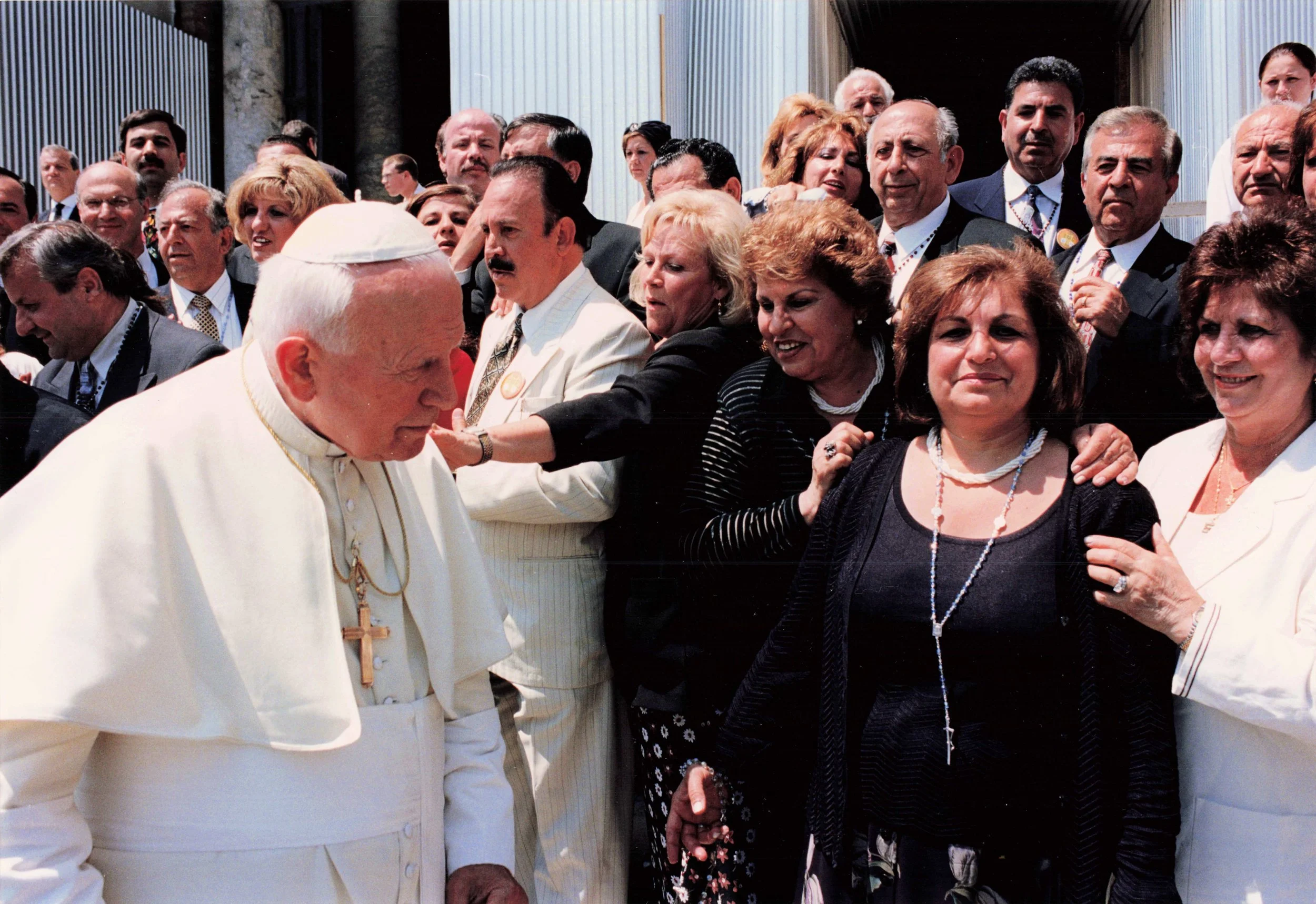Love in Bloom
The Pauls have been married for 68 years.
Portraits of a Happy Marriage
By Sarah Kittle
Many people say that the secret to a good marriage is intimacy, commitment, and communication; however, the ingredients to a happy, healthy marriage vary across time and across cultures.
With faith and family prioritized, it is no wonder that the Chaldean community has so many couples that have been married for so long. We interviewed two of those couples to discover what goes into a longtime happy marriage.
The Pauls’
Meet Barbara and Francis Pauls. They were married on October 10, 1955, when Barbara was 14 and Francis was 19. Like many marriages at the time, it was arranged; Francis’ mom chose Barbara for her son. They didn’t know each other at all and didn’t even live near each other. Francis lived in Baghdad, and Barbara in Araden, in northern Iraq.
Francis didn’t particularly want to marry – he was young and carefree. Barbara didn’t even realize she was getting married. “Someone told me ‘Barbara, this is your fiancé,’ and I said, ‘no he’s not’ and I ran away. I thought they were kidding. I was young, and didn’t even know what marriage was,” Barbara recalls through an interpreter.
They didn’t even have one date before marrying and had no communication with each other before becoming husband and wife.
So, the families must have known each other, right? “My mom liked my wife and her family,” said Francis. “That is why she chose her for me.”
“My parents knew he came from a good family,” remembers Barbara, “so that is why they allowed me to marry him.”
There was no engagement; each was told by their parents that they would be getting married and to whom. This was a brief period of time before the actual wedding, which as they recall went something like this: “Saturday afternoon, we got married at church. Usually everyone goes home after - they go to their parents’ house because even though they are married the bride and groom do not go home together.
“On Sunday they go to church together, and after church they go to the bride’s house. After lunch they start the wedding outside. Then on the third day, the priest goes to the groom’s house and prays over the bed of the bride and groom. Thereafter, the bride stays with the groom. The bride and groom don’t stay together until the 3rd day.”
Francis still didn’t want to get married. For Barbara, the most difficult part came with the realization that she would not be going back home to her parents. But it was their culture.
One of the cultural traditions that was brought into the marriage was the Khigga dance.
“When we got married, at that time men and women did not dance next to each other while line dancing; they were separated,” Francis recalls. “The day of our wedding, my mom brought new couples, and engaged couples and they all danced in the line (Khigga) together. It was the first time I saw men and women dance next to each other.”
For themselves, Francis and Barbara created their own family traditions. Every Sunday, they would go to church together and have a family gathering after Mass. They still see their kids every Sunday even now, although Barbara sometimes misses church because of her leg and back pain.
They’ve been married going on 68 years, yet they’ve only celebrated one anniversary – their 60th, because the kids surprised them. “It was a lot of fun,” they recall.
Their relationship weathered some storms, including a conflict between the Kurds and the Iraqi government in the 1960s which drove Francis and Barbara south to Baghdad. Another war, this one between Iraq and Iran, drove them out of the country altogether but not before sending their two eldest children ahead to America.
“It was a difficult time,” they recall. Francis traveled with another son to the U.S. in December of 1980, and Barbara finally arrived with the other three children a month later. They had stayed in Italy for 14 months. Coming to America was not easy. It was “a new country where we did not know anything, and we had to start life all over again,” remembers Francis.
What got them through that difficult time? It will come as a surprise to no one that the answer is prayer. “We pray a lot,” says Francis, “especially the Rosary.” Difficult times strengthened their relationship, but patience and eventually love kept them together. “Even though we didn’t marry because we loved each other, we ended up loving each other a lot.”
Francis and Barbara were lucky. She says he is kind, has always helped her around the house and has always been nice to her. He says she’s kind and good, a good wife and mom. He also thinks she’s pretty and a good cook. They both seem happy.
Francis sums it up nicely: “Our love built this house.”
During an anniversary trip in 1998, Mike and Nedal Denha met Pope (Saint) John Paul II.
The Denhas
Meet Mike and Nedal Denha. They met in the United States in 1968. Both were here, trying to make a living in a new land independent from their parents. Describing their marriage as a “true partnership,” the Denhas tied the knot 55 years ago and have been growing their relationship ever since.
In true Chaldean fashion, it was family that made the match. (After all, it is a matter of fact that God will use family members to manifest His will.) Nedal’s uncle, John George, sent her to apply for a job with his nephew, Mike George. Thomas Denha, there on business with Mike, happened to get a glimpse of Nedal and said to himself, “She would be a great catch for Cousin Mike” (Denha). Thomas proceeded to plan a family gathering that would bring the two together. The rest, as they say, is history.
A letter was sent to Nedal’s parents in Baghdad, asking for their permission to marry their daughter to Mike. The Denhas were very well known in Iraq as makers of tahini and their family was held in high regard, so about a month later, blessings were sent for the union.
Nedal was happy with the match. “He was handsome, a real gentleman,” she recalls. “He was also humble and kind.”
As for Mike, he was wowed. “She was a very beautiful girl, polite, respectful, and soft-spoken.”
Their first date was spent discussing all manner of things. In a little restaurant on 7 Mile Road in Detroit, Mike and Nedal talked about life, family, Chaldean culture, and building the future—including what they wanted for their kids and agreeing on the importance of education.
They each spoke three languages – Arabic, English, and Sureth. Growing up in Baghdad, Nedal’s main language was Arabic, although her parents spoke Sureth in the home. Mike, from Tel Kaif, spoke in Sureth but was also fluent in Arabic and English. The three languages competed to be the main one, and Sureth survived.
Five months after their initial meeting, they were wed in a ceremony that included most of the Chaldeans in Michigan. “We were one big family,” said Mike. “When someone got married, we pretty much invited everyone in the community.”
Nedal had a small engagement party at her aunt’s home, but the wedding was such a celebration that Mike worried about the attendees getting home safely, having had “too much fun.”
Much like the Pauls’ wedding, the ceremony was extended. Mike and Nedal were married at noon, then driven to their separate homes to prepare for the rest of the day. Mike and the limo driver picked Nedal up at 7PM to attend the wedding reception; from then on, they lived as husband and wife.
For Nedal, the big realization was, “I’m not going home anymore.” To be more accurate, her home had changed. Home was now wherever Mike was. On this foundation, they built an amazing legacy.
Along with all the Chaldean traditions they brought into the marriage, the Denhas added their own throughout the years. One that has passed on to their children is the practice of planning not only family vacations, but couples vacations, date nights, and dinner with friends. Taking time for themselves and each other was quite modern thinking for the time but has come to be known as a “secret ingredient” for couples today.
The communication that began on their first date has served them well throughout the years, raising 6 children in a tight-knit family and still enjoying each other’s company. In 1998, Mike and Nedal met Pope (Saint) John Paul II on one of their anniversary trips. That experience would be hard to beat. When asked what they plan to do for their next anniversary, the answer was spending it with family, talking about the future.
Their best advice to young couples? Learn how to compromise. That doesn’t mean always giving in, but rather listening to each other and respecting the others’ feelings. Faith in God is critical, but faith in each other is important as well. That comes from honest communication, understanding, and trust. It builds over time.
And don’t lose your sense of humor. “We laugh a lot.” Mike additionally offers, “Serve each other.” Going into a marriage with high expectations almost certainly guarantees dissatisfaction. Nedal gave this advice to her children before they married: “Forgive. Be faithful. Be honest. Communicate.”
How do they resolve disagreements? You wait a bit and cool down before talking, they both agree. And remember your favorite things about each other. For Mike, that’s his bride’s amount of love for her family. In addition to being a terrific mother, Nedal kept a good relationship with his side of the family. That’s important, especially in the Chaldean culture. “She’s always been there when I needed her,” Mike says with a smile.
“I love and respect how humble Mike is,” says Nedal. “He’s a hard worker who provides well and gives unconditional love to his family.
“Most of all,” says Nedal with a twinkle in her eye, “he loves my cooking.”
Enough said.


